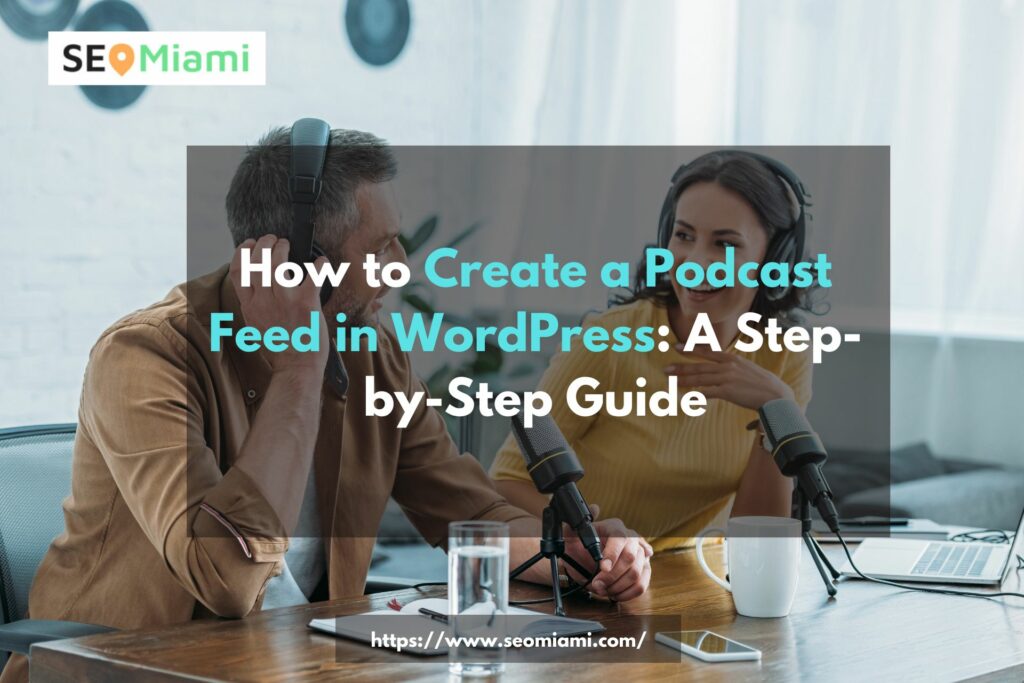If you’re passionate about sharing your thoughts, expertise, or stories with the world, starting a podcast can be an excellent platform. With WordPress, the process of creating and managing a podcast feed becomes incredibly accessible. In this guide, we’ll take you through the step-by-step process of creating a podcast feed in WordPress, ensuring that your voice reaches a wider audience.
Introduction
Podcasting has become an immensely popular medium for sharing information and connecting with audiences. By following these steps, you’ll be able to create a podcast feed in WordPress that not only showcases your content but also ranks well in search engines.
Setting Up Your WordPress Environment
Installing and Configuring WordPress
Before you dive into podcasting, make sure you have a WordPress website up and running. If you don’t already have one, choose a reliable web hosting provider, install WordPress, and configure the basic settings.
Choosing the Right Podcasting Plugin
Selecting the right plugin can greatly simplify the process of setting up a podcast feed. Opt for a plugin that offers features such as episode management, media hosting, and compatibility with podcast directories.
Structuring Your Podcast Feed
Organizing Episodes Effectively
Organize your episodes into seasons and categories, making it easier for your audience to navigate and find content. Consistent categorization enhances user experience and helps with SEO.
Crafting Compelling Episode Titles and Descriptions
Catchy episode titles and informative descriptions can significantly impact whether a user decides to listen. Incorporate relevant keywords naturally while maintaining an engaging tone.
Uploading and Hosting Your Podcast Episodes
Adding Media to Your WordPress Posts
When creating episodes, use the “Add Media” option to upload your podcast files. WordPress supports various audio formats, ensuring compatibility across different platforms.
Embracing Reliable Hosting Solutions
Consider hosting your podcast media files on dedicated platforms designed for podcasters. This approach ensures faster loading times and prevents overloading your WordPress site.
Optimizing Your Podcast for SEO
Integrating Relevant Keywords
Identify keywords related to your podcast niche and incorporate them into your episode titles, descriptions, and show notes. This practice enhances the discoverability of your podcast.
Crafting SEO-Optimized Episode Show Notes
Your show notes provide additional context for your episodes. Use them to expand on episode content, include relevant links, and naturally integrate keywords.
Validating Your Podcast Feed
Utilizing Podcast Validators
Run your podcast feed through validators to ensure it complies with industry standards. This step is crucial for compatibility with podcast directories and platforms.
Ensuring Compatibility Across Platforms
Test your podcast feed on various platforms and podcast directories to ensure that it displays correctly and consistently. This approach maximizes your potential audience reach.
Publishing and Promoting Your Podcast
Making Your Podcast Live
Once everything is set up and validated, publish your podcast feed. Ensure that it’s accessible on your website and compatible with popular podcast platforms.
Leveraging Social Media and Online Communities
Promote your podcast on social media platforms and engage with online communities related to your podcast’s niche. Building a strong online presence can significantly boost your podcast’s visibility.
Engaging with Your Audience
Encouraging Feedback and Reviews
Encourage your listeners to provide feedback and reviews. Positive reviews can attract new listeners, while constructive feedback helps you enhance your podcast’s quality.
Incorporating Listener Suggestions
Pay attention to suggestions and requests from your audience. This not only shows that you value their input but also keeps your content relevant and engaging.
Monetizing Your Podcast
Exploring Sponsorships and Ads
As your podcast grows, you can explore sponsorship opportunities and incorporate ads into your episodes. Choose sponsors that align with your podcast’s values and resonate with your audience.
Setting Up Paid Subscription Models
Consider offering premium content to your dedicated listeners through paid subscription models. This can be an additional revenue stream while providing exclusive value.
Conclusion
Creating a podcast feed in WordPress involves several steps, from setting up your environment to engaging with your audience and potentially monetizing your efforts. By following this guide, you’ll be well-equipped to share your passion and content with the world.
